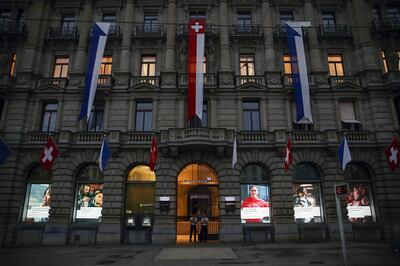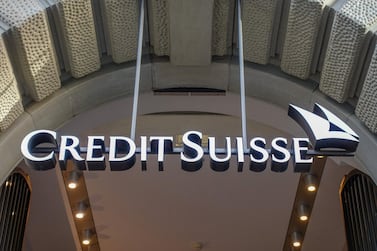Authorities at the St Lucia airport were already on high alert in January when Jason Fielding landed on his way to a nearby private island in the Caribbean. Mr Fielding was a last-minute guest, raising concerns among officials who interviewed him. A search of his bags found a pile of electronic equipment and a night-vision camera.
Mr Fielding worked for global surveillance firm Diligence International and was gathering information on Neil Gerrard, a renowned white-collar crime lawyer who was representing Eurasian Natural Resources, Mr Gerrard and his wife claim in a lawsuit.
ENRC is a mining company that is the target of one of the UK’s most talked-about corruption investigations which has been in a long-running dispute with Mr Gerrard. It was named as a defendant in the case, according to a filing on Friday.
A High Court judge in London will now hear the damages claim brought by Mr Gerrard, who leads American law firm Dechert's white-collar and securities litigation practice outside the US, and his wife Ann against Diligence in which they detail some of the invasive methods used in the modern world of corporate espionage.
Along with trailing him on the family holiday in the Caribbean, Diligence workers mounted a motion-triggered surveillance camera on a tree at his home south of London, and spied on him during a lunch meeting near his office, the original claim states.
The Gerrards accuse Diligence of harassment, a breach of privacy, violating data protection laws and trespassing on private property. They also said they’re “greatly concerned’’ about the possibility that their computers were hacked. The revelations add to the mounting evidence of how extreme spycraft has become a daily part of the corporate world and how it often skirts dangerously close to the limits of the law.

It emerged last month that Credit Suisse Group hired private detectives to follow the Swiss bank’s former head of wealth management through the streets of Zurich, something the lender later referred to as “an isolated incident”.
The case also provides a glimpse of the drama around an investigation which has become a litmus test for how determined the UK is to crack down on top-level white-collar crime.
In 2013, the UK’s Serious Fraud Office started investigating suspicions that ENRC, founded by three billionaires from the former Soviet Union, paid bribes in Democratic Republic of Congo to access valuable copper and cobalt mines. The probe brought a sell-off of shares and led to the company falling out of London’s benchmark FTSE 100. The founders took it private and moved the mining assets into a new company called Eurasian Resources Group, which is not under investigation.
The company has since launched an expansive legal counteroffensive. It has sued both the SFO and Mr Gerrard and his firm, which ENRC fired in 2013, claiming they're in a conspiracy. The SFO has breached its duties as a fair prosecutor by working with Mr Gerrard, according to ENRC, which is seeking £70 million (Dh333.6m) in damages for legal fees and has asked for a judge to halt the probe. The SFO denies the allegations and is continuing the investigation.
Separately, ENRC says Mr Gerrard and Dechert are conspiring to drum up their fees, meeting with the SFO in secret and leaking confidential material to the press as well. Last week, ENRC told the court that Mr Gerrard had erased handwritten notes on a document he then gave to the SFO to disguise where it had come from. Mr Gerrard and Dechert deny the allegations.
In his defence, Mr Gerrard denies any wrongdoing and says ENRC are simply reacting badly to the “serious criminality,” including $40m in cash it paid to a businessman and friend of Congo’s then-president. ENRC, which denies any wrongdoing, declined to comment on the case, as did the SFO.
Diligence and its lawyer didn't respond to requests for comment on Mr Gerrard's allegations and/or Mr Fielding's actions. His personal contact information wasn't otherwise available. A lawyer for Mr Gerrard declined to comment.
Business investigations company Diligence started “unlawful covert surveillance activity” on Mr Gerrard in January or earlier, he said in his claim.
The firm, founded by former intelligence officers in 2000, says on its website that its investigators use “overt and covert techniques to piece together complex patterns of activity” and that it fosters a “creative and audacious approach, while ensuring our work is proportionate and respectful of the laws of the jurisdiction in which” it is operating.
Mr Gerrard alleges that Diligence started its surveillance of him by trying to install a wireless camera on his property. It then opted for a wired video camera system capable of recording the make, model and colour of vehicles, as well as their registration number and the facial characteristics of the driver, according to the documents. It built a hide for a wireless cellular device and covered it with chicken wire and foliage, he said.
That month, Mr Gerrard and his wife, a local judge, went on a two-week holiday with friends to a private Caribbean island, best accessed from St Lucia. Diligence found out their travel details — including the villa where they were staying — and put two of its agents on the same nine-hour flight, the Gerrards said.
The men tried to get on to the island, telling authorities they were the couple’s nephews. They made a mistake, though, and referred to them by their first names David and Elizabeth, though both coincidentally go by the middle names, Neil and Ann, the pair said.
Mr Gerrard’s daughter blew their cover and they were denied entry. That’s what tipped off authorities to be more vigilant by the time Mr Fielding made a last-minute booking at a hotel on the island, the claim continues. Though he told authorities that he was on a solo holiday paid for by his “extremely rich” employer, officials discovered the surveillance equipment in his luggage and he was denied access, it says.
Back in London, Diligence had obtained details of a lunch Mr Gerrard was having at a hotel restaurant near his office and deployed two agents to wait for him there, according to details in the claim. They may have escaped detection, but, according to the Gerrards, the physically fit plain-clothed men walked past 10 to 15 empty tables and sat next to Mr Gerrard’s table, constantly using a laptop and mobile phone while he ate with his friend. When, suspicious, Mr Gerrard asked the restaurant manager about the men, he replied that he didn’t know them, but that they were “very interested” in Mr Gerrard.
On Friday, the London judge ordered ENRC and Diligence not to put the Gerrards under surveillance or for any of their workers to come within 10 metres of a place whether either of them are until the lawsuit is concluded.






